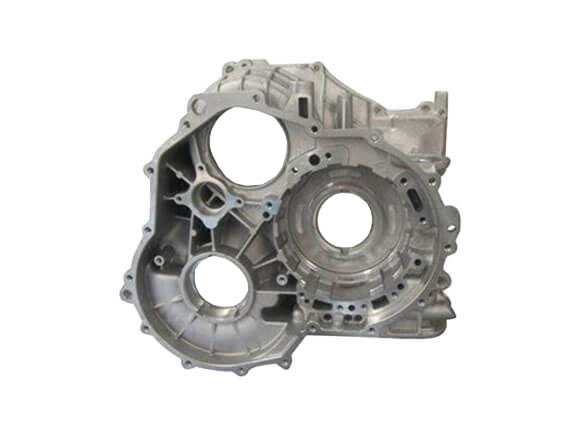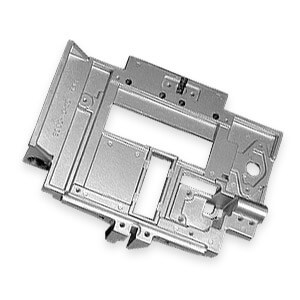Exactly How Aluminum Casting Adds To Effective Production Solutions
Aluminum casting plays a necessary duty in modern production. Its light-weight nature and deterioration resistance make it a preferred option for different sectors. Techniques such as die spreading and sand casting enable the creation of elaborate parts with minimal waste. The combination of automation more enhances production efficiency. The implications of these developments prolong beyond simple efficiency - Precision aluminum casting. Understanding the wider effect exposes substantial understandings right into the future of production
The Benefits of Light Weight Aluminum in Manufacturing
Although different metals are used in manufacturing, light weight aluminum stands out due to its distinct residential or commercial properties that enhance production efficiency and item performance. Its lightweight nature especially minimizes transport prices and energy needs in various applications. Light weight aluminum's superb deterioration resistance guarantees longevity and resilience, reducing the requirement for frequent replacements and upkeep. This steel can be easily built and formed, permitting for flexible design alternatives that satisfy particular industry requirements. Furthermore, light weight aluminum shows superior thermal and electrical conductivity, making it an ideal selection for applications requiring reliable warmth dissipation and electric management. The recyclability of light weight aluminum additionally plays an important duty in sustainable production methods, as it can be recycled without losing its integral residential properties. Generally, the benefits of aluminum in making lead to set you back savings, enhanced item long life, and a lowered ecological impact, making it a preferred material in countless markets.
Trick Light Weight Aluminum Casting Techniques
Aluminum spreading methods are necessary for producing top notch components in different making procedures. The primary techniques consist of sand spreading, pass away spreading, and investment spreading. Sand spreading entails creating a mold from sand, which permits huge parts and complicated forms. This strategy is often favored for its cost-effectiveness and flexibility. Pass away spreading, on the various other hand, utilizes high-pressure to inject molten aluminum into steel molds, resulting in accurate, uniform components appropriate for high-volume manufacturing. Financial investment spreading uses premium surface area coating and detailed information by utilizing a wax pattern that is disappeared to form the mold and mildew. Each of these methods has particular applications and benefits, allowing producers to select the most appropriate method based on aspects like manufacturing volume, product, and complexity specs. By understanding these key techniques, manufacturers can boost their manufacturing effectiveness and ensure the stability of their aluminum parts.
Impact on Automotive Market
As the auto industry significantly prioritizes lightweight materials to enhance gas effectiveness and performance, light weight aluminum casting has become an essential option. This manufacturing procedure permits automakers to produce complicated components with lowered weight without jeopardizing structural stability. By utilizing light weight aluminum casting, suppliers can produce components such as engine blocks, transmission housings, and suspension parts that are not only lighter yet likewise show excellent thermal conductivity and deterioration resistance.
The versatility of light weight aluminum spreading techniques enables the production of detailed styles, helping with technology in car aesthetic appeals and capability. As vehicles end up being a lot more technologically advanced, the capability to integrate attributes like innovative safety systems and electric drivetrains ends up being essential.

Aerospace Applications of Aluminum Casting
Aluminum casting plays an essential role in aerospace applications by enabling the production of lightweight structural components that enhance fuel performance. In addition, the accuracy of light weight aluminum spreading permits the development of complex engine parts, which are necessary for peak performance and reliability. This combination of light-weight products and specific design positions light weight aluminum casting as an essential technology in the aerospace industry.
Light-weight Architectural Components
In the pursuit for improved performance and efficiency in aerospace applications, light-weight architectural elements have come to be increasingly crucial. Aluminum casting plays a crucial role in this undertaking, giving makers with the capability to produce components that are both strong and lightweight. The low thickness of aluminum enables substantial weight reductions without endangering structural honesty, which is crucial for airplane efficiency and fuel performance. Furthermore, light weight aluminum castings can be crafted to satisfy specific style needs, enabling the production of complicated geometries that standard production approaches may battle to accomplish. This flexibility not only simplifies production procedures but also contributes to total cost financial savings. As the aerospace industry continues to highlight sustainability, the demand for lightweight light weight aluminum parts is expected to increase, better advancing advancement in production.
Precision Engine Parts
Suppliers significantly count on light weight aluminum casting to generate precision engine parts for aerospace applications, driven by the product's distinct residential properties. Aluminum's light-weight nature significantly reduces general airplane weight, improving gas performance and performance. Its excellent rust resistance assurances long life in harsh environments, making it optimal for essential engine components. Additionally, aluminum casting enables intricate layouts and limited tolerances, vital for enhancing engine performance and dependability. The casting process also supports mass production, enabling manufacturers to meet high need while keeping high quality requirements. As aerospace innovation remains to advance, the role of light weight aluminum spreading in developing precision engine components will certainly be critical in achieving higher effectiveness and technology here are the findings in airplane style and capability.
Sustainability and Ecological Advantages
The growing emphasis on sustainability in production has actually placed aluminum spreading as a leading remedy for ecologically mindful production. This procedure makes use of recycled aluminum, which considerably lowers power consumption contrasted to main aluminum manufacturing. By leveraging scrap metal, manufacturers can reduce their carbon footprint and reduce waste, straightening with worldwide sustainability goals.
In addition, light weight aluminum casting creates fewer harmful exhausts, adding to a cleaner environment. The light-weight nature of aluminum additionally enhances gas effectiveness in transport applications, additionally promoting green methods.
Additionally, the longevity and corrosion resistance of aluminum bring about longer product lifespans, lowering the requirement for constant substitutes and preserving sources. As markets progressively focus on lasting selections, light weight aluminum casting sticks out as an ingenious technique that not only satisfies production demands but also sustains ecological stewardship. This dedication to sustainability settings aluminum spreading as an essential player in the shift in the direction of a greener manufacturing landscape.
Price Effectiveness in Production
Expense effectiveness is a substantial advantage of light weight aluminum spreading, matching its sustainability advantages - Precision aluminum casting. The process of light weight aluminum casting permits for the production of intricate shapes with very little waste, which is specifically essential in an my sources affordable production atmosphere. Making use of light weight aluminum decreases power prices, as it has a lower melting point compared to other steels, bring about reduced energy usage during manufacturing
Furthermore, light weight aluminum's lightweight residential properties contribute to decrease shipping and taking care of prices, even more improving total expense efficiency. The durability and corrosion resistance of light weight aluminum cast items likewise imply that they require less maintenance and replacement with time, causing lasting cost savings for suppliers.
In addition, advancements in casting technologies, such as boosted mold and mildew styles and automation, have streamlined manufacturing processes, reducing labor prices and raising outcome efficiency. On the whole, expense efficiency in light weight aluminum casting plays an essential function in enhancing manufacturing operations and supporting affordable prices techniques.
Future Patterns in Light Weight Aluminum Spreading
The future of aluminum spreading is increasingly formed by developments in automation and lasting product innovations. Automation modern technologies are expected to boost efficiency and accuracy in the spreading process, while sustainable practices aim to lower environmental effect. With each other, these fads guarantee to redefine production standards and methods within the light weight aluminum casting industry.
Automation in Aluminum Casting
Accepting automation is changing aluminum casting procedures, leading the way for improved performance and accuracy. Automated systems improve production by decreasing human intervention, decreasing mistakes, and increasing throughput. Technologies such as robot arms and computer numerical control (CNC) devices permit regular and exact shaping of light weight aluminum elements. Furthermore, clever sensing units monitor different specifications in genuine time, making certain perfect conditions throughout the casting process. This combination of automation not only shortens lead times however likewise improves item top quality by keeping tighter tolerances. As producers significantly take on these innovative modern technologies, the light weight aluminum spreading sector is readied to experience substantial renovations in functional effectiveness, cost-effectiveness, and competition in the international market.
Lasting Material Innovations

Frequently Asked Concerns
What Types of Aluminum Alloys Are Typically Used in Spreading?
Commonly used aluminum alloys in casting include 356, 380, and 413. These alloys are preferred for their exceptional fluidness, stamina, and deterioration resistance, making them suitable for a range of industrial applications.
How Does Aluminum Spreading Contrast to Other Metal Casting Techniques?
Light weight aluminum casting normally provides lower weight, remarkable rust resistance, and better thermal conductivity contrasted to other steel casting methods. In addition, it allows for intricate layouts and faster production cycles, boosting general manufacturing performance and performance.
What Industries Advantage The Majority Of From Light Weight Aluminum Casting?
The automobile, aerospace, and electronics industries profit most from light weight aluminum spreading. These industries utilize its lightweight, corrosion-resistant homes to boost efficiency, decrease gas usage, and improve total item effectiveness, making aluminum casting significantly crucial.
Exist Details Layout Limitations With Light Weight Aluminum Spreading?
Yes, light weight aluminum spreading has layout restrictions, including constraints on wall surface thickness, complex geometry obstacles, and prospective issues with achieving tight tolerances (Precision aluminum casting). These variables can you could try these out influence the overall strength and capability of the final item
Just How Is Quality Assurance Maintained in Light Weight Aluminum Spreading Processes?
Quality control in aluminum casting procedures is maintained through rigorous evaluations, adherence to standard procedures, and making use of advanced technologies. Regular tracking guarantees dimensional accuracy, surface area stability, and product uniformity throughout manufacturing, advertising overall reliability.
As the auto industry progressively prioritizes lightweight materials to boost fuel effectiveness and performance, light weight aluminum spreading has emerged as an essential option. Light weight aluminum spreading plays a vital duty in aerospace applications by making it possible for the manufacturing of light-weight structural components that improve gas efficiency. Expense efficiency is a considerable benefit of aluminum casting, enhancing its sustainability advantages. Accepting automation is transforming aluminum spreading procedures, paving the means for improved efficiency and precision. Recycled aluminum use has actually obtained grip, considerably decreasing energy intake contrasted to main aluminum production.